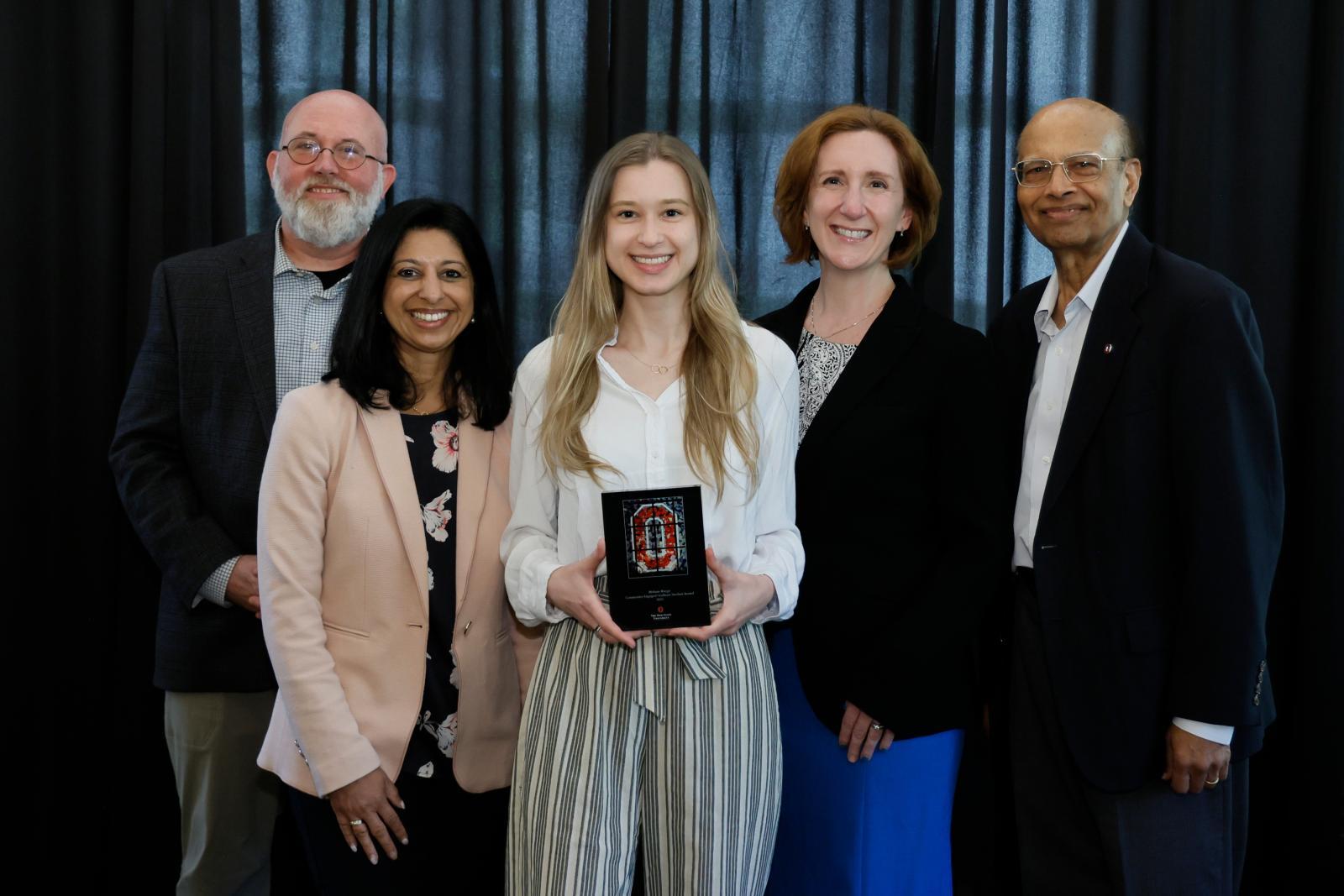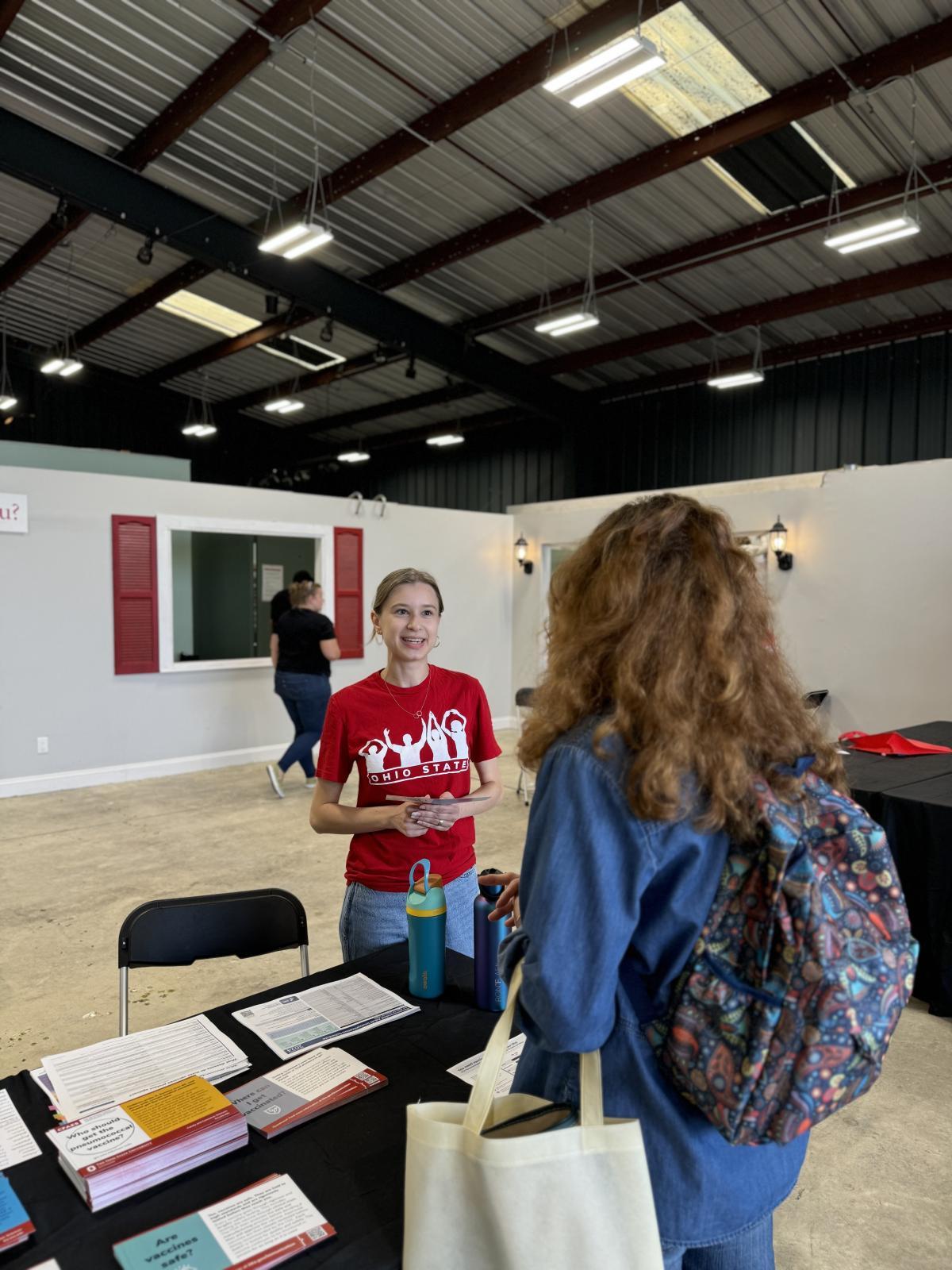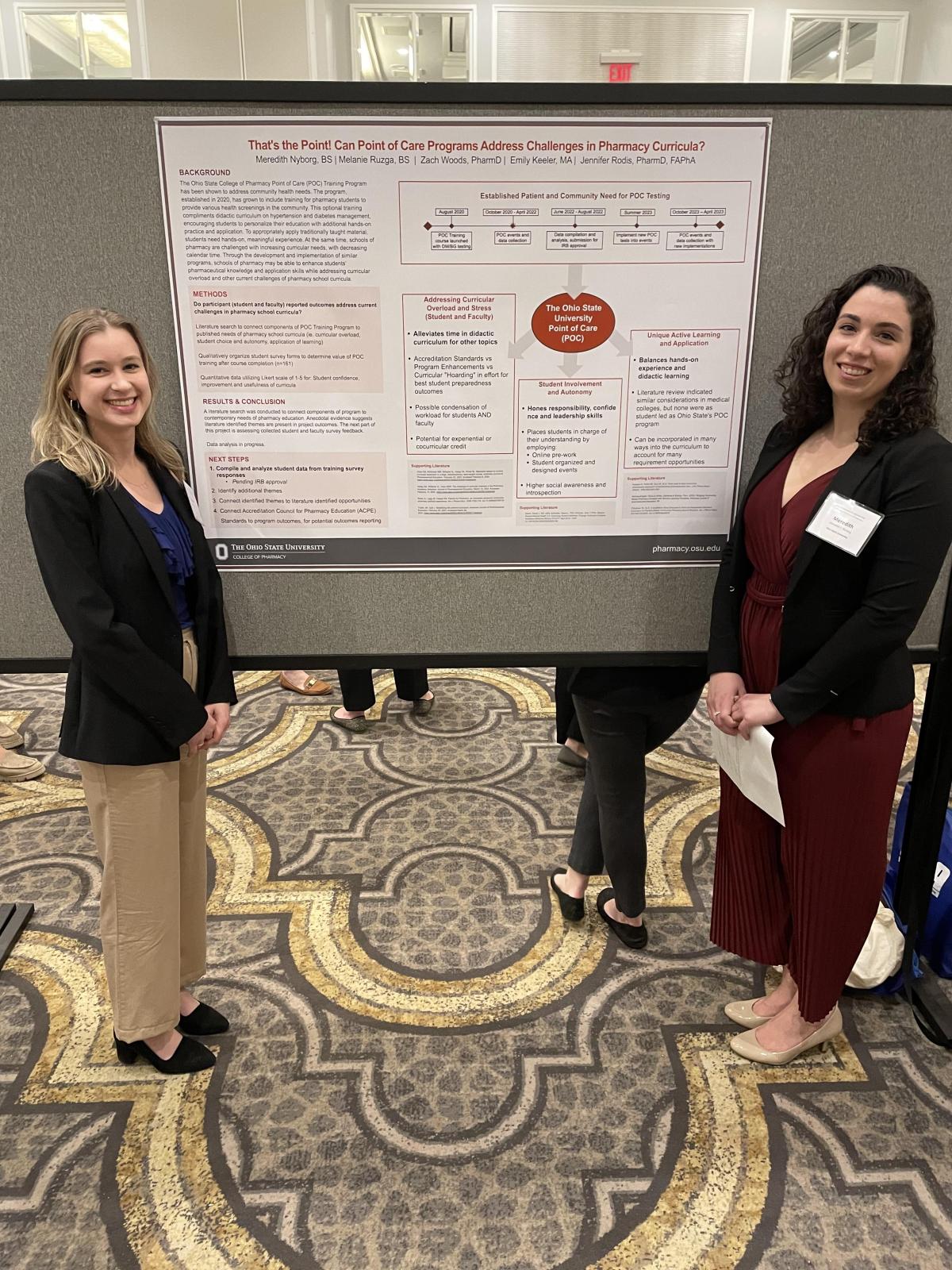Melanie Ruzga recognized twice for high-impact community engagement

This article was published in The Script Magazine – Autumn 2025.
After six years at The Ohio State University College of Pharmacy, rising P3 student Melanie Ruzga, BSPS ’23, is receiving recognition for the innovative community educator that she has become.
This spring, Ruzga received two major awards recognizing her engagement with the community and outstanding work as a pharmacy educator – she was one of 89 students awarded the Excellence in Public Health Pharmacy Award by the United States Public Health Services (USPHS) and, separately, she was selected for the Community Engaged Graduate Student Award by the Ohio State Office of Outreach and Engagement.
Ruzga has fostered her dedication to advancing public health and the pharmacy profession since her time as an undergraduate student at the College of Pharmacy. As a PharmD candidate, she has made an impact on the college and communities spanning the state of Ohio.
“I was inspired to see pharmacy out there in the world, not just in our classrooms and the traditional community pharmacies,”
Introducing class content to the community
As a fourth-year undergraduate student, Ruzga initiated her own introduction to pharmacy outreach and education by using her Ohio State Second-Year Transformational Experience Program (STEP) funds to research the impact of accessible point-of-care testing (POCT) in Columbus. Students participating in STEP can earn a fellowship of up to $2,000 to use toward a self-designed experiential learning opportunity that supports their personal and professional growth.
After a few stalled starts due to the COVID-19 pandemic, she completed the data collection portion of her project in 2022 by accompanying Dr. Woods and a team of PharmD students to the annual African American Wellness Walk. The College of Pharmacy has been represented at the Columbus event for years, offering POCT and providing a space for participants to learn about how they can maintain a healthy lifestyle.

At the walk, Ruzga collected data on the impact of POCT and counseling offered to participants. As she watched the group work, Ruzga saw classroom health education transform into actionable conversation.
“I was so amazed to see how engaged Dr. Woods was with the community,” Ruzga said. “Beyond collecting data about how POCT offered benefits to this community, I remember that Wellness Walk as a window into what I could be doing in the future, and also a moment of realizing what it means to actually use the content we encounter in class.”
Since shadowing Dr. Woods, Ruzga has become an enthusiastic champion of connecting pharmacy professionals to their communities. Ruzga used her STEP funds to expand the college’s POCT offerings by purchasing blood pressure cuffs for Dr. Woods and the accompanying students.
“How we engage with content in class can affect someone’s life in the future,” Ruzga said. “Shadowing Dr. Woods made that very clear to me.”
Taking outreach to a new level
While serving as an undergraduate student assistant for the College of Pharmacy’s wellness team, Ruzga organized collaborative student outreach efforts and provided support to the college’s wellness and community builder, Emily Keeler, MA. Keeler and the wellness team are responsible for organizing many of the college’s POCT events and trainings.
“Melanie has grown immensely since she first arrived as an undergraduate student with our office,” Keeler said. “She went above and beyond, leading to many opportunities to expand her work and our college’s impact.”
Through her role with the wellness team, Ruzga was connected with assistant professor Myriam Shaw-Ojeda, PharmD, as a student contributor for the Extension Collaborative on Immunization Teaching and Engagement (EXCITE) project – a joint effort between the USDA's National Institute of Food and Agriculture (NIFA) and the Centers for Disease Control and Prevention (CDC).
As a member of the team, Ruzga reviewed what publicly accessible vaccination resources existed and worked alongside Dr. Shaw-Ojeda to develop more holistic vaccine education materials for use in rural communities across Ohio.
“There was a big learning curve to pare down all of the scientific jargon that I’d been taught to use in class,” Ruzga recalled. “But it has been so useful to become more precise with my language. Now, when I’m having difficult health care conversations with anyone, I know how to do so effectively, regardless of their knowledge."
Designing accessible tools came with its challenges, but Ruzga benefited from a strong, collaborative team that supported her growth throughout the project. During the development of the toolkit and materials, she and Dr. Shaw-Ojeda met regularly with rural community members to test and refine their work.
“As pharmacy professionals, it was so important to get feedback from non-clinicians during development,” Ruzga said. “Our reviewers were the ones who would be using and promoting the toolkit, so if they didn’t understand our approach, we could take their feedback and pivot to a more effective method of educating.”
The team workshopped the toolkit from 2023-2024. It is currently available online and is being disseminated widely by Ohio State Extension offices.
“It means so much to me as a pharmacy professional that I don’t just exist within the classroom,” Ruzga reflected. “There are people out there accessing the toolkit website or picking up the educational materials we designed at their local library. People are making different and better choices for their health thanks to a project I contributed to.”

Since completing the toolkit, Ruzga has continued to utilize the team’s designed tools to launch health care conversations at outreach events, such as the annual Farm Science Review. This collaboration with the Ohio State College of Food, Agricultural and Environmental Sciences (CFAES), creates a space for pharmacy professionals to engage with community members on health care topics.
“It’s a very different ball game when you’re face-to-face with someone who’s pushing back on something like the flu vaccine,” Ruzga said. “With my knowledge on making vaccines easier to understand, and having learned from our rural contributors how to reach different people, I’m able to reroute these conversations in a respectful manner and engage in meaningful counseling and education.”
Ruzga presented the team’s work at the 2024 International Social Pharmacy Workshop in Banff, Canada, providing analysis on patient takeaways from the toolkit. As the toolkit and learning resources continue to spread through Ohio communities, Ruzga continues to support the EXCITE project.
“Students need to have the courage to try something new outside of the classroom,” Dr. Shaw-Ojeda said. “Melanie has grown so much in her ability to take complex medical information and make it easy to understand for the general population. Her experiences so far have prepared her to be a leader as an educator and strategic thinker. I am so proud of her journey.”
Without a hint of slowing down, Ruzga expects to continue along her current trajectory, making time during her school year to engage with local communities and support the EXCITE project’s further success. During her final year before rotations, she’s preparing to take on additional leadership on the EXCITE team.
As a recipient of the Community Engaged Graduate Student Award, Ruzga received a $500 fund, which will be dedicated to continued preventive health outreach. Ruzga will spearhead this endeavor as project manager and is currently finalizing details for the program expansion.
“Seeing how pharmacy works in the real world has changed my pathway completely,” Ruzga said. “As an undergraduate, you learn so much about technical science and chemistry, and as you prepare for a career in pharmacy, you can so easily lose focus on what the end goal of pharmacy is. It’s about the patient—the person in front of you. Being able to see how the chemistry and science are affecting people in the real world is so important, and that’s why I love community ed. so much.”